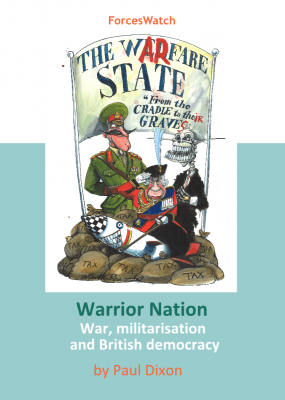Warrior Nation: War, militarisation and British democracy

This report explores how the ‘Militarisation Offensive’ – which started in 2006 to improve public recognition and support for the armed forces – failed to produce majority support for the war in Afghanistan but deepened the militarisation of British politics and society. Since 2006 the military have broken constitutional convention and made public attacks on politicians, leading to the most severe tensions in political-military relations since the Second World War.
Published by ForcesWatch, 2018. ISBN: 978-0993095511
Download the report | Buy the report
About Warrior Nation
The report explores: the relationship between public opinion and military operations and rhetoric; how the Armed Forces Covenant was invented and how it and other initiatives, such as Armed Forces Day and the promotion of the armed forces in schools, have extended the influence of the military in civilian life; how the military exerted pressure for maximum involvement in both Iraq and Afghanistan and then deflected responsibility onto politicians; and, how public criticism from senior military figures has sought to influence political decision making around defence and undermine support for Jeremy Corbyn’s leadership of the Labour party.
Reviews
This explosive report shows conclusively how senior members of the armed forces intervened to win over the hearts and minds of the British public at the height of the Iraq-Afghanistan campaigns. In doing so, it asks: What are the implications for our democracy when the military oversteps its bounds? Essential reading for anyone opposed to the cycle of war without end. Vron Ware, Kingston University London and author of Military Migrants: Fighting for YOUR country
If you have not yet begun to explore the many faces of the ‘Military Offensive’, this new publication will help you navigate your way through the language, practices, policies and culture that are used to give more power and kudos to the military. While the major focus of analysis is the post 2006 period and the impact of the offensive on public opinion and politics, it reminds us that this path was established through the UK military involvement in Northern Ireland, Afghanistan and Iraq. Of special interest to me is the relationship between the military and schools. The reinvention and promotion of armistice and Armed Forces Day, ‘military ethos’ and cadets in schools, have contributed to a deeper military penetration of our education system; this report puts them in a wider context. An important resource for all concerned with the militarisation of our society and where pressure needs to be brought to effect a change. Pat Gaffney, General Secretary, Pax Christi UK
We are at a pivotal moment in the militarisation of British politics and democracy. Paul Dixon shows us how we got here — and what can be done. Joanna Bourke, Birkbeck College, University of London and author of Wounding the World: How military violence and war-play invade our lives
In granular detail, this report documents the ways in which the British armed forces have usurped control from the civilian authority. Drawing attention to the democratic deficit such a move entails, the report elicits deep concern about the powers vested in the military institution, which is tasked with, and entrusted to, perform violence on behalf of the state, rather than in contravention of it. Paul Higate, University of Bath and Associate Editor of Critical Military Studies
Related articles/films
The concerted effort to increase the power of the military across society must be challenged, Morning Star, 02/07/2018
How public opinion constrains Britain’s military interventions, Morning Star, 01/08/2018 Three presentations were recorded at the launch of the report in June 2018:
- Warrior Nation: war, militarisation and British democracy, by Professor Paul Dixon
- Military Britain by Professor Joanna Bourke
- Militarism in public life in the UK, Emma Sangster, Coordinator of ForcesWatch
